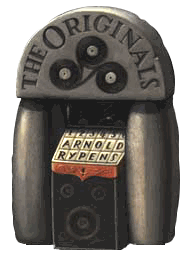PINETOP'S BOOGIE WOOGIE
Created on 10/02/2002Latest update on 27/09/2023
Artist: Clarence 'Pinetop' Smith
Author: Clarence Smith
Label: Vocalion
Year: 1928
Cow Cow Davenport urged Pinetop to move from Pittsburg (where he played with Ma Rainey) to Chicago, where he shared an apartment with Meade Lux Lewis and Albert Ammons. Pinetop was the first to use the word 'boogie woogie'. That is not saying he invented this 'brother of the blues'. Like so many musical terminology, boogie woogie is jive-talk, slang coined by Dan Burley in his influential Handbook Of Harlem Jive as: second degree syfilis. That's what you get with all these creepy left hand piano notes. The origin of this highly characteristic piano style: elements are rooted in Hershal Thomas' intro for Sippie Wallace's Special Delivery Blues (1926), also in his brother George Thomas' New Orleans Hop Scop Blues, first recorded by Clarence Williams Blue Five in 1923 with Sidney Bechet on soprano sax. Same pattern also appeared in Jimmy Blythe's Jimmy's Blues ('24); his Chicago Stomp ('24) is often described as the first pure boogie woogie recording. Another two years earlier, boogie bass figures appear in George Thomas' Muscle Shoals Blues (played by Fats Waller). In 1917 Little Brother Montgomery (at the age of 11) heard his first boogie-woogie pattern. In 1915 pianist Willie 'The Lion' Smith heard his first boogie woogie in Atlantic City. In 1913 T-Bone Walker heard a sort of boogie woogie in a church in Dallas. Albert Ammons' father played it with a few of his pupils in 1910 in Louisville, Kentucky. W.C. Handy heard it for the first time in Memphis in 1909, J. Mayo Williams (Pinetop Smith's mentor) in 1906 in Chicago, Jelly Roll Morton even in 1904 in New Orleans. Lead Belly claimed boogie woogie existed in 1899 in Caddo Co., Texas, where it was used since 1870 in woodcutting factories, lumbercamps and terpentine plants. Which makes it even older than ragtime.
Covers:
- 1928:
Albert Ammons [Pinetop's roommate in Chicago as Boogie Woogie Stomp]
- 1935:
Cleo Brown [as Boogie Woogie; Tommy Dorsey's inspiration]
- 1937:
Count Basie [idem, before Tommy Dorsey]
- 1938:
Tommy Dorsey [idem]
- 1940:
- 1941:
- 1945:
Roy Milton [as Milton's Boogie; hit R&B]
- 1946:
- 1953:
Little Johnny Jones [as I May Be Wrong]
- 1953:
Pinetop Perkins [with Earl Hooker and Willie Nix for Sun]
- 1957:
Champion Jack Dupree [as Old Time Rock 'n' Roll]
- 1961:
Don Covay & The Goodtimers [in Pony Time]
- 1961:
Chubby Checker [idem; n°1 US & R&B]
- 1964:
Rob Hoeke Boogie Woogie Quartet [as Boogie Woogie Stomp]
- 1978:
Nighthawks [with Pinetop Perkins on piano]
- 1986:
Duolian String Pickers [alias The Notting Hillbillies to be, as Pine Top Boogie on cd Found... having too much fun (Tower Records - '23)]
- 1995:
Pinetop Smith didn't live to witness the success of his boogie woogie (especially since Tommy Dorsey's bigband arrangement): two months after he recorded his version he was shot in a dancehall in Chicago, victim of a quarrel amongst patrons going out of hand. Don't shoot at the pianist.


